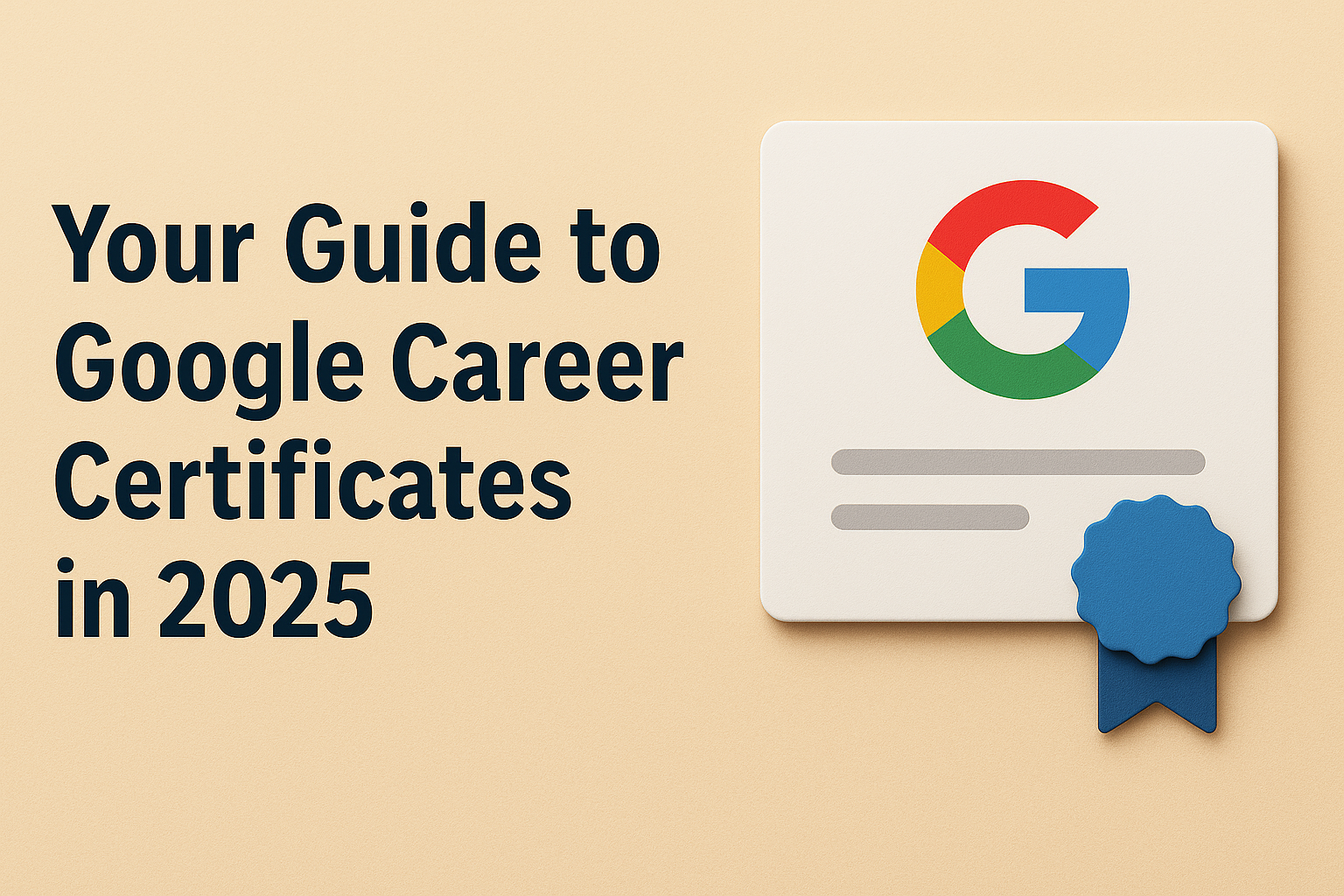Trying to break into a tech career can feel daunting, especially when you look at the cost of traditional degrees. That’s where Google Career Certificates come in. They offer a flexible, affordable path to learning job-ready skills in high-growth fields, and you can do it all online, on your own schedule.
Created by experts at Google, these programs are designed to take you from beginner to job-ready in about three to six months, with no degree or prior experience required. More than 70% of U.S. graduates report a positive career outcome—like a new job, a raise, or a promotion—within six months.
To keep the content current, Google has also added AI training to all its foundational certificates. You won’t just learn the core skills for your field; you’ll also learn how to use AI tools to do your job better, whether that’s drafting a project plan or identifying a security risk.
The certificates are broken down into a few categories:
- Foundational Certificates: These are the core programs for anyone new to a field. They cover popular areas like Data Analytics, UX Design, Cybersecurity, and Project Management.
- Advanced Certificates: If you’ve already completed a foundational certificate or have some experience, these let you dive deeper. Think IT Automation with Python or Advanced Data Analytics.
- Career Essentials: These are shorter courses like AI Essentials that teach you a specific, valuable skill you can add to your resume quickly.
How “Free” Are They, Really?
The word “free” gets thrown around a lot, so let’s be clear about what it means with Google’s certificates. You absolutely can access the course material and even earn a certificate without paying, but you need to know which path to take.
Option 1: Audit the Course (Learn for Free)
The easiest way to access the learning materials is by “auditing” the course on Coursera. This gives you access to all the video lectures and readings.
The catch? You can’t submit assignments for grades, get feedback, or earn the final certificate. This option is perfect if you’re just exploring a field or want to learn a specific skill for yourself. To find it, you have to go to the individual course page (not the main certificate page) and look for the small “Audit” link.
Option 2: Apply for Financial Aid (Get the Certificate for Free)
If you need the verified certificate for your resume but can’t afford the fee, Coursera’s Financial Aid program is your best bet. If approved, you get full access to everything, including graded assignments and the certificate, at no cost.
The process takes a little effort:
- Find the “Financial aid available” link on the course page.
- Fill out the application, which includes a couple of short essays (150 words each) about your financial situation and career goals.
- Wait about two weeks for a decision.
You have to apply for financial aid for each course within the certificate program separately. One important tip: do not start the 7-day free trial, as it will automatically cancel your pending financial aid application.
Option 3: Find a Scholarship Program
Google also partners with nonprofits in the U.S. to offer scholarships that cover the full cost. Organizations like Merit America and Social Finance provide free training and support, sometimes with an income-share agreement where you only pay back the cost after you’ve landed a job earning over a certain amount. You have to apply for these programs directly through the partner organizations, not on Coursera.
A Word of Warning: The “Free Trial” Trap
Coursera heavily promotes a 7-day free trial, but be careful. It requires a credit card and will automatically convert to a paid subscription (around $59/month) if you don’t cancel in time. It’s a good way to preview a course, but it’s not a path to a free certificate.
A Closer Look at the Top Google Career Certificates
When choosing a certificate, it helps to know which fields have the highest demand and starting salaries in the U.S. Cybersecurity and UX Design often lead the pack, while Data Analytics and Project Management offer solid, middle-tier starting points. IT Support and Digital Marketing are great for getting your foot in the door, though with more modest starting pay.
1. Google Cybersecurity Professional Certificate
- What You’ll Learn: How to protect systems and information, identify security risks, and use tools like SIEM to stop threats. The course also prepares you for the CompTIA Security+ exam.
- Duration: About 6 months (at 7 hours/week).
- Job Paths & U.S. Salary: Cybersecurity Analyst or SOC Analyst. Entry-level roles typically range from $80,000 to $100,000 a year.
2. Google UX Design Professional Certificate
- What You’ll Learn: The full design process, from understanding user needs to creating wireframes and interactive prototypes in tools like Figma and Adobe XD.
- Duration: About 6 months (at <10 hours/week).
- Job Paths & U.S. Salary: UX Designer, UI Designer, or Web Designer. Expect a starting salary between $70,000 and $90,000, but you’ll need a strong portfolio to land a job.
3. Google Data Analytics Professional Certificate
- What You’ll Learn: How to collect, clean, analyze, and visualize data using tools like SQL, R, and Tableau to help businesses make smarter decisions.
- Duration: About 6 months (at <10 hours/week).
- Job Paths & U.S. Salary: Data Analyst or Junior Data Analyst. Entry-level salaries typically fall in the $60,000 to $75,000 range.
4. Google Project Management Professional Certificate
- What You’ll Learn: How to manage projects from start to finish using both traditional and Agile methods. You’ll learn to create plans, manage budgets, and lead teams.
- Duration: About 6 months (at <10 hours/week).
- Job Paths & U.S. Salary: Project Coordinator or Assistant Project Manager. Starting salaries are generally between $60,000 and $75,000.
5. Google IT Support Professional Certificate
- What You’ll Learn: The fundamentals of IT, including hardware, software, networking, and troubleshooting. This is Google’s most popular certificate and a great entry point into tech.
- Duration: About 6 months (at <10 hours/week).
- Job Paths & U.S. Salary: IT Support Specialist or Help Desk Technician. Expect an entry-level salary of $45,000 to $65,000.
6. Google Digital Marketing & E-commerce Professional Certificate
- What You’ll Learn: The basics of online marketing, from SEO and social media to email campaigns and e-commerce, using tools like Google Ads and Shopify.
- Duration: About 6 months (at <10 hours/week).
- Job Paths & U.S. Salary: Digital Marketing Coordinator or Social Media Specialist. Starting salaries are typically in the $45,000 to $60,000 range.
7. Advanced Certificate: Google IT Automation with Python
- What It Is: The next step after the IT Support certificate. You’ll learn to automate IT tasks using Python and Git, opening the door to higher-paying roles like Systems Administrator.
8. Advanced Certificate: Google Business Intelligence
- What It Is: A follow-up to the Data Analytics certificate. You’ll learn advanced skills like data modeling and building dashboards with tools like BigQuery and Tableau, preparing you for roles like BI Analyst.
9. Essentials: Google AI Essentials
- What It Is: A quick course (under 10 hours) that covers the basics of AI and how to use it responsibly. It’s a great micro-credential to add to any resume to show you’re up-to-date with current tech.
10. Essentials: Google Prompting Essentials
- What It Is: A short, practical course on how to write effective prompts for generative AI. As AI becomes more common, this is a valuable skill to have.
Which Certificate Is Right for You?
Choosing a path depends on your interests and career goals. This table breaks down the foundational certificates to help you compare them at a glance. Certificates that teach hard technical skills and specific software (like Python, SQL, or Figma) can give you an edge, as recruiters often search for those keywords.
How U.S. Employers Really View These Certificates
Google promotes its Employer Consortium, a group of over 150 companies like Deloitte, Verizon, and Target that are open to hiring certificate graduates. After you finish, you get access to a job platform to connect with these companies.
In reality, the certificate is best seen as a “positive signal” to hiring managers. It shows you have initiative and a foundational understanding of the field. While it won’t replace a degree or hands-on experience, it can definitely help you get your foot in the door, especially for entry-level roles. For some companies, it’s also a great way to find diverse talent from non-traditional backgrounds.
Think of the certificate as your starting line, not the finish line. To land a job, you still need to:
- Build a Portfolio: Especially for UX Design and Data Analytics, a portfolio is essential. Use the projects from the course as your first pieces.
- Get Hands-On Experience: Look for freelance gigs or volunteer projects to apply your skills.
- Nail the Interview: Use the career resources that come with the certificate, like interview prep tools, to get ready.
For anyone serious about getting a job, paying for the verified certificate (or getting it through financial aid) is worth it. It’s the official credential you can put on your resume and LinkedIn, and it’s what employers recognize.
FAQs: Your Questions, Answered
Are these certificates a replacement for a college degree?
No, but they are a great alternative path into tech. For many entry-level jobs, employers now care more about skills than a four-year degree. A certificate can get your foot in the door, though a degree may still be preferred for some long-term career paths.
How do I list an audited course on my resume?
Don’t put it under “Certifications.” Instead, add it to a “Professional Development” section as “Audited Coursework: Google [Course Name] via Coursera.” It shows you’re proactive without claiming a credential you didn’t earn.
Are the new AI skills actually useful for getting a job?
Yes, absolutely. AI literacy is quickly becoming a basic requirement. Having formal training in how to apply AI in your field gives you a significant advantage and shows employers your skills are up-to-date.
Can I really get a job with just a certificate and no experience?
It’s challenging but possible. The certificate provides the knowledge to get you an interview. To land the job, you need a portfolio of projects that proves you can apply that knowledge.
How long do I have to complete a course if I get Financial Aid?
Once approved, you have 180 days to complete the course. If you can’t finish in time, you can submit another application.
Conclusion & Next Steps
In 2025, you don’t need to go into debt to gain valuable, job-ready skills. With options like auditing and financial aid, you can start learning from the free Google Career Certificates 2025 offerings today. Pick a field that interests you, explore the coursework, and if it feels like the right fit, apply for financial aid to earn the full credential. It’s a low-risk, high-reward way to start building your future in tech.





[…] do, not just what you’ve studied. Forget the mountain of debt. We’ve found seven high-paying career paths where a focused certification is your fastest route to a top-tier […]
[…] is exactly why Google Career Certificates have become so popular. These aren’t just online classes; they’re professional training […]